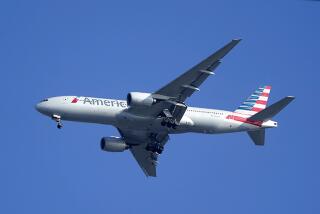Deadline Nears for Airport Baggage Screening Measures
- Share via
WASHINGTON — As the airline industry scrambles to meet its first major security deadline, government and aviation officials said they do not anticipate major disruptions when new baggage screening measures go into effect Friday.
Transportation Secretary Norman Y. Mineta is scheduled to explain the new measures in a speech today. However, the plan is only temporary, until a system for checking all bags with specialized explosive detection machines can be put in place.
“The airlines have been particularly vocal about their preparedness, which indicates to me that they are expecting this to go smoothly,” said Kevin Mitchell, chairman of the Business Travel Coalition, which monitors the industry. “There are probably some airports where they won’t get it right on the first day, but, by and large, we will get through it.”
However, some critics say the baggage screening measures are insufficient because they leave loopholes that terrorists could exploit.
Under the interim plan, airlines will use a combination of measures to screen checked baggage, all of which were prescribed by Congress in a transportation security bill passed late last year. Mineta initially said he doubted the congressionally mandated deadline of Friday could be met, but he later reversed that opinion.
The basic screening technique, called bag matching, involves ensuring that no bag is loaded into the cargo hold unless the passenger who checked it also gets on the plane. In addition, a greater proportion of bags will be searched by hand, with specially trained dogs or explosive detection machines.
Officials acknowledged that the combination of measures is not guaranteed to stop a suicide bomber, but they said it represents a tangible improvement. Until now, only a tiny proportion of checked bags on domestic flights has been screened for explosives. These bags were either picked at random or belonged to passengers flagged for closer scrutiny by computerized profiling systems. And bag matching--a basic security procedure employed by other nations--had only been required for international flights.
In preparation for bag matching, Delta Air Lines announced Tuesday that it would no longer accept checked baggage less than 30 minutes before a flight is scheduled to depart.
U.S. airlines have long been opposed to bag matching on domestic flights, and the new rules included a concession to the industry’s fears of widespread delays: Bag matching will only be required when a passenger first boards a plane, and not on connecting flights.
“They are giving the airlines a pass on the connecting bags,” said David Stempler, president of the Air Travelers Assn., an advocacy group for passengers. About one of every four travelers is a connecting passenger.
Arnold Barnett, an MIT professor and aviation consultant, said that making an exemption for connecting flights exposes travelers to some additional risk.
“I hope that after this is introduced, people will find a way to expand it to connecting flights,” Barnett said. “It is still a big step forward.”
Airlines could close the loophole by scrutinizing connecting bags more closely when they are first accepted. They could simply use one of the other approved methods: trained dogs, explosive detection machines or hand searches. Industry officials refused to discuss specifics, but Deborah McElroy, president of the Regional Airline Assn., said: “The traveling public can rest assured that all checked bags will be screened.”
Ultimately, Congress wants all checked bags scanned using state-of-the-art explosive detection machines. Lawmakers have set a Dec. 31 deadline to meet that goal.
About 160 of the machines, which use CT technology similar to that in medical scanners, are currently in service at airports around the country.
More to Read
Sign up for Essential California
The most important California stories and recommendations in your inbox every morning.
You may occasionally receive promotional content from the Los Angeles Times.










